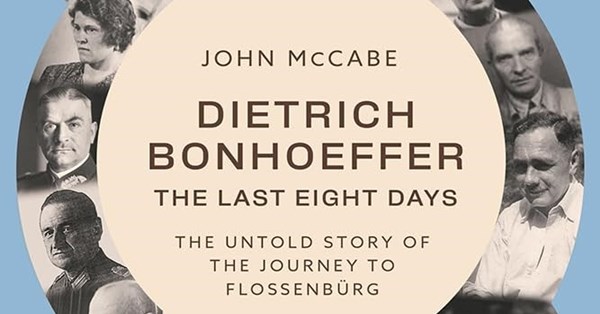FEW would dispute Dietrich Bonhoeffer’s place among the modern martyrs on the west front of Westminster Abbey. Many have read at least some of his writings and appreciated how they are both of their time and yet do speak into our own.
The final message delivered to his friend George Bell, Bishop of Chichester, by Captain Payne Best, one of Bonhoeffer’s fellow prisoners on his final journey, was: “This is the end. For me the beginning of life.” It became one of the most frequently cited Bonhoeffer apophthegmata. Payne Best survived the war. His account of Bonhoeffer’s last days and hours became part of the narrative of Bonhoeffer’s life, beginning with the biography by Eberhard Bethge published in English in 1970.
Bonhoeffer was arrested by the Gestapo on 5 April 1943. John McCabe’s remarkable and strangely fascinating book picks up the story almost exactly two years later. From his prison cell, Bonhoeffer had written: “Is something within me still like a beaten army, fleeing in disorder from a victory already achieved?” In April 1945, it was certain that Germany would be defeated by the allied forces, who were already on German soil. The Reich was descending into chaos, and millions of people were on the move, those fleeing west before the advancing Red Army, escaping the bombed-out cities, prisoners on death marches, prisoners of war, people trying to save their own skin.
Eight carefully selected VIP prisoners, among them Bonhoeffer, were put in a wood-powered prison van, a grüne Minna, and sent out of Berlin, where Bonhoeffer had hitherto been imprisoned, first to Buchenwald and then south to Bavaria, where Bonhoeffer would die by hanging on 9 April 1945.
McCabe has carefully reconstructed this final journey, tracing information about Bonhoeffer’s fellow travellers. Among them were not only Payne Best, but, for example, Vasily Kokorin, a Russian POW who had attempted to deceive his captors by pretending to be Molotov’s nephew; Erich and Margot Heberlein, former German diplomats; Sigmund Rascher, complicit in the deaths of 200 people through medical experiments; and Heidel Nowakowski, a singer with a somewhat complex past.
McCabe offers a tapestry of people, their backstories, and their connections with one another and with Bonhoeffer, as well as insights into the places that this unusual group of prisoners passed through. The author has gathered many fragments across Europe, and the fragmented nature of the book perhaps reflects the world in which these events took place.
But it is the story of its creation as much as the burying of some urban myths that makes this endeavour impressive. McCabe discovered Bonhoeffer when he was an ordinand. In setting out to reconstruct the events of Bonhoeffer’s final week, he made many connections across Europe, not least with current inhabitants of Schoenberg, a small town in Bavaria, where Bonhoeffer celebrated an Easter Day service at the request of his fellow prisoners on the day before he died.
This is an unusual book, full of detail alongside a bigger picture, helpful maps, ten appendices, and many photos. Inevitably, any insight into Bonhoeffer’s reflections and emotions has to remain guesswork, but McCabe has done what can be done and provided a very detailed account of the situation and the encounters that emerged from it.
Maybe Bonhoeffer and his life and legacy will be less familiar and less iconic to future generations. But, for those of us who have lived with this story for many years, here is a fascinating new approach to a narrative that is perhaps more complex and less tidy than posthumous iconography would have us believe.
Dr Natalie K. Watson is a theologian, writer and editor, based in Peterborough.
Dietrich Bonhoeffer — The Last Eight Days: The untold story of the journey to Flossenbürg
John McCabe
Baylor University Press £39
(978-1-4813-2167-9)
Church Times Bookshop £34.20
















